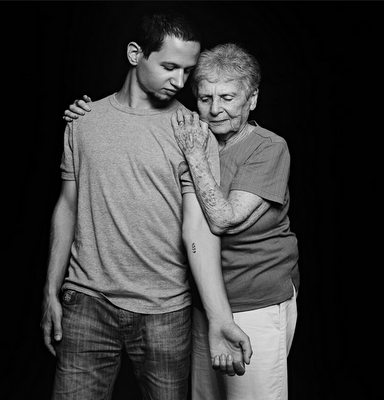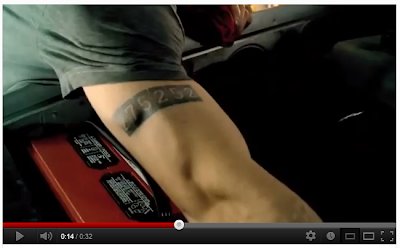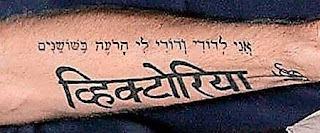Some were surprised that Drew didn’t convert to the Jewish faith before getting married (this is her third marriage) or at the least before delivering her first baby. But she reported that it was a long process and she didn’t want to take the plunge before she was ready. About Judaism, Drew has said “It’s a beautiful faith and I’m so honored to be around it. It’s so family-oriented… the stories are so beautiful and it’s incredibly enlightening. I’m really happy.”
 |
| Photo: Algemeiner.com |
Well, it now appears that Drew is ready for her conversion and she’s taking a rather drastic step. TMZ.com reports that “Former wild child Drew Barrymore has decided to REMOVE her tattoos because she is CONVERTING to Judaism for her husband Will Kopelman! The new mom wishes to be buried in a Jewish cemetery, something that can only happen if she erases all permanent ink from her person.”
Drew has six tattoos according to the post on TMZ and will experience quite a bit of pain as she’s having all six removed in preparation for her conversion. But what I want to know is who is advising Drew that she has to have these tattoos removed before converting to Judaism. As I wrote on this blog almost five years ago, the notion that Jews cannot be buried in a Jewish cemetery if they have tattoos is a myth. It’s a bubbe-meise, an old wives’ tale. An article in the NY Times even referred to this supposed prohibition as an “urban legend,” explaining that, “the edict isn’t true. The eight rabbinical scholars interviewed for this article, from institutions like the Jewish Theological Seminary and Yeshiva University, said it’s an urban legend, most likely started because a specific cemetery had a policy against tattoos. Jewish parents and grandparents picked up on it and over time, their distaste for tattoos was presented as scriptural doctrine.”
While I wouldn’t encourage someone who was converting to Judaism to get a tattoo I also wouldn’t make them have any preexisting tattoos removed. There’s just no reason to go through the painful process of tattoo removal before Jewish conversion since the rule forbidding those with tattoos to be buried in a Jewish cemetery is a myth. As I explained in my blog post, Rabbi Alan Lucas, in a 1997 teshuvah (legal response) for the Conservative Movement’s Committee on Jewish Law and Standards, raised the question of tattooing in Judaism. Lucas concluded that there are diverse opinions among the rabbis concerning the the prohibition of tattooing based on the Torah’s verse in Leviticus 19:28 stating, “You shall not make gashes in your flesh for the dead, nor incise any marks on yourselves: I am the Lord.”
The mishnah explains that it is the lasting and permanent nature of tattooing which makes it a culpable act, but Rabbi Simeon disagrees and says that it is only the inclusion of God’s name which makes tattooing prohibited. I don’t believe that Drew Barrymore has any tattoos on her body that include God’s name so that shouldn’t be an issue. Furthermore, there will likely be several important laws of Judaism that Drew will not follow after her conversion. I don’t think that she should somehow raise the importance of a prohibition of tattooing above many important laws that she’ll likely gloss over.
If Drew decides to forgo the tattoo removal, I can promise her that she won’t be the only Jewish person with tattoos. And she certainly won’t be the only Jewish celeb with tattoos either (see Lena Dunham and Adam Levine). Even though Drew wasn’t Jewish at the time, the couple was married by a rabbi, had a ketubah witnessed, and stood under a chuppah. And according to the Algemeiner.com website, Drew and Will Kopelman have promised to raise their daughter Olive in a traditional Jewish manner. I think that’s great, but if I were the one advising her in her conversion to Judaism I would focus less on those tattoos and more on Shabbat observance, keeping kosher, and sending Olive to a Jewish day school. I wish Drew the best of luck in her conversion process.



